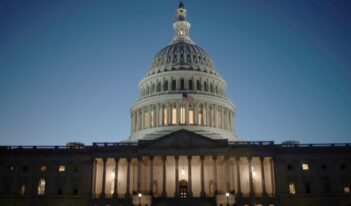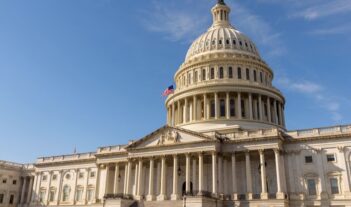
Scholars explore how Section 1115 waivers can expand or reduce health coverage.
One in five Americans receive their health insurance coverage from Medicaid. This coverage, however, can vary drastically from state to state. One key—and controversial—contributor to this diversity takes the form of what are known as Section 1115 Medicaid demonstration waivers.
The Medicaid program functions as a federal-state partnership to provide health coverage to low-income individuals. Each state administers its own program, which is jointly financed by both the federal and state governments. In exchange for federal funding, states must comply with federal requirements about eligibility and benefits.
But for states seeking flexibility, Section 1115 of the Social Security Act provides a potential solution.
Under Section 1115, a state can ask the Secretary of Health and Human Services (HHS) to waive certain federal requirements so that the state can undertake a “demonstration project.” A Section 1115 proposal is supposed to be approved only if the Secretary finds it will promote the objectives of the Medicaid program—namely, furnishing medical assistance to low-income individuals. Historically, states have sought Section 1115 waivers to expand coverage for substance abuse disorders and respond to public health emergencies.
During the Trump Administration, however, the Centers for Medicare & Medicaid Services (CMS) approved waivers for more contentious purposes.
For example, CMS approved waiver requests from 11 states seeking to impose work requirements on individuals trying to qualify for Medicaid. In seeking the Trump Administration’s approval, proponents of these waivers claimed that the added work requirements would encourage independence and financial stability among beneficiaries. Critics, however, argued that the bureaucratic obstacles created by the requirement would lead to many low-income adults losing essential health care coverage. In the state of Arkansas, for example, more than 18,000 individuals lost Medicaid coverage following implementation of the state’s work requirement.
Under the Biden Administration, CMS has begun revoking prior approvals for work requirements, stating that these demonstration projects risk substantial coverage loss and do not promote the objectives of the Medicaid program.
As of August 2021, CMS has approved 63 demonstration projects and is considering 31 more. The results of these initiatives may provide key insight as the national debate continues over how best to deliver health care in the United States.
In this week’s Saturday Seminar, experts discuss the impact of Section 1115 waiver demonstrations on Medicaid coverage.
- States have used Section 1115 waivers to implement ideological policies, argues attorney Anthony Albanese in an article published in The Yale Law Journal Forum. Albanese identifies three significant patterns in 1115 implementation: the expansion of the scope of 1115 waivers; the effective preclusion of attempts at nationwide health care reform; and the motivation for waivers varying from what the statute allows. Albanese argues that these patterns occur due to excessive deference to state policy preferences and that waivers should instead be held to the same standards of public health interventions. Albanese also supports waivers that deal with small, localized issues and urges the Office of Management and Budget and HHS to relax the requirement that waivers be cost neutral for every year of the program.
- In an article published in the Saint Louis University Journal of Health Law & Policy, Mary Crossley of the University of Pittsburgh School of Law explores the negative consequences of imposing work requirements on Medicaid beneficiaries. Crossley explains that most Medicaid enrollees are already employed, and those who are not often cannot work due to family responsibilities or disability. Crossley also argues that some enrollees rely on Medicaid to stay healthy enough to work, so losing coverage due to administrative hurdles would actually threaten their employment. Crossley contends that the negative effects of work requirements may be most severe among people with disabilities and African Americans.
- HHS should formalize the process by which waivers are granted, argues Matthew B. Lawrence of Emory Law in an article published in the William & Mary Law Review. Lawrence claims that HHS uses its waiver authority to align state policy choices with the priorities of the White House. In addition to inviting states to adopt specific reforms, Lawrence argues HHS also signals what types of waivers the agency will not be willing to accept—effectively halting certain reform efforts before they can begin. To avoid legal challenges, Lawrence recommends HHS issue guidance describing formal protocols for waiver negotiations, which he argues should include documenting such negotiations through official correspondence and with reference to statutory authority.
- In an article published in the Annals of Health Law and Life Sciences, attorney Tracy Douglas argues that the impact of Section 1115 waivers has impeded access to health insurance for low-income people. Douglas claims that outsourcing Medicaid to private insurance companies—made possible through waivers—increases the likelihood that patients will face administrative difficulties in securing care. Douglas also argues that Section 1115 waivers change the nature of Medicaid by promoting “personal responsibility” and consumerism through premiums, work requirements, and copayments. Douglas recommends that policymakers prioritize consumer protection by ending the imposition of harsh requirements and instead ensuring that consumers are treated fairly.
- The Trump Administration’s waiver policies sought to revive measures previously rejected by Congress, argues David A. Super of the Georgetown University Law Center in an article published in the UCLA Law Review. Super argues that the previous Administration failed to reflect the objectives of Medicaid and reversed CMS’s original interpretation of Section 1115 when it approved work requirements for Medicaid. Super also criticizes the agency’s failure to hold statutorily required public hearings. Super concludes that the waivers granted during the Trump Administration contravened Section 1115 because they failed to incorporate the kinds of research designs needed if they were indeed demonstration projects.
- In a study for Health Affairs, Emmeline Chuang of the UC Berkeley School of Social Welfare and several coauthors provide an overview of California’s efforts to implement a pilot program designed to increase care coordination through a Section 1115 waiver. The 25 pilot programs in the state differed in approaches to data sharing, but all programs reported an increase in data-sharing capacity. Pilot programs also offered a range of social services in addition to care coordination, including housing support and benefits assistance. Chuang and her coauthors identify several implementation challenges such as engaging beneficiaries in care and ensuring patient privacy when sharing data. Chuang and her coauthors conclude that the results from California suggest that other states can achieve cross-sector integration of care under Medicaid if adequate financial incentives are present.
The Saturday Seminar is a weekly feature that aims to put into written form the kind of content that would be conveyed in a live seminar involving regulatory experts. Each week, The Regulatory Review publishes a brief overview of a selected regulatory topic and then distills recent research and scholarly writing on that topic.



